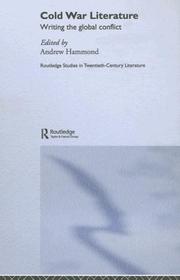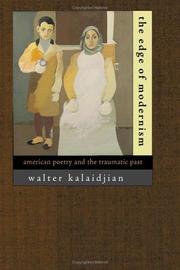| Listing 1 - 5 of 5 |
Sort by
|

ISBN: 128056380X 9786610563807 020369516X 9780203695166 0415349486 9780415349482 9781134272501 9781134272549 9781134272556 9780415544023 0415544025 1134272545 Year: 2006 Publisher: London ; New York : Routledge,
Abstract | Keywords | Export | Availability | Bookmark
 Loading...
Loading...Choose an application
- Reference Manager
- EndNote
- RefWorks (Direct export to RefWorks)
The Cold War was the longest conflict in a century defined by the scale and brutality of its conflicts. In the battle between the democratic West and the communist East there was barely a year in which the West was not organising, fighting or financing some foreign war. It was an engagement that resulted - in Korea, Guatemala, Nicaragua and elsewhere - in some twenty million dead. This collection of essays analyses the literary response to the coups, insurgencies and invasions that took place around the globe, and explores the various thematic and stylistic trends that Cold War hostilities
Literature, Modern --- War and literature. --- Cold War in literature. --- Politics and literature. --- Literature --- Literature and politics --- Literature and war --- History and criticism. --- Political aspects
Book
Year: 2006 Publisher: Johns Hopkins University Press
Abstract | Keywords | Export | Availability | Bookmark
 Loading...
Loading...Choose an application
- Reference Manager
- EndNote
- RefWorks (Direct export to RefWorks)
In The Edge of Modernism, Walter Kalaidjian explores American poetry on genocide, the Holocaust, and total war as well as on postwar social antagonisms, racial oppression, and domestic violence. By asking what it means for traumatic memory to have agency in the American verse tradition, Kalaidjian creates an original historical account of how American poets became witnesses, often unconsciously, to modern extremity. Combining psychoanalytic theory and cultural studies, this intense, sweeping account of modern poetics analyzes the ways in which literary form gives testimony to the trauma of twentieth-century history. Through close readings of well-known and less familiar poets—among them Langston Hughes, Countee Cullen, Claude McKay, Edwin Rolfe, Sylvia Plath, Adrienne Rich, Peter Balakian, Rachel Blau DuPlessis, Anne Sexton, and Anthony Hecht—Kalaidjian discerns the latent "edge" of modern trauma as it cuts through the literary representations, themes, and formal techniques of twentieth-century American poetics. In this way, The Edge of Modernism advances an innovative and dynamic model of modern periodization.
Slavery in literature. --- History in literature. --- Cold War in literature. --- Genocide in literature. --- Modernism (Literature) --- Anti-communist movements in literature. --- Holocaust, Jewish (1939-1945), in literature. --- Literature and history --- American poetry --- History --- History and criticism. --- Literary studies: poetry & poets
Book
Year: 2006 Publisher: Johns Hopkins University Press
Abstract | Keywords | Export | Availability | Bookmark
 Loading...
Loading...Choose an application
- Reference Manager
- EndNote
- RefWorks (Direct export to RefWorks)
In The Edge of Modernism, Walter Kalaidjian explores American poetry on genocide, the Holocaust, and total war as well as on postwar social antagonisms, racial oppression, and domestic violence. By asking what it means for traumatic memory to have agency in the American verse tradition, Kalaidjian creates an original historical account of how American poets became witnesses, often unconsciously, to modern extremity. Combining psychoanalytic theory and cultural studies, this intense, sweeping account of modern poetics analyzes the ways in which literary form gives testimony to the trauma of twentieth-century history. Through close readings of well-known and less familiar poets—among them Langston Hughes, Countee Cullen, Claude McKay, Edwin Rolfe, Sylvia Plath, Adrienne Rich, Peter Balakian, Rachel Blau DuPlessis, Anne Sexton, and Anthony Hecht—Kalaidjian discerns the latent "edge" of modern trauma as it cuts through the literary representations, themes, and formal techniques of twentieth-century American poetics. In this way, The Edge of Modernism advances an innovative and dynamic model of modern periodization.
Slavery in literature. --- History in literature. --- Cold War in literature. --- Genocide in literature. --- Modernism (Literature) --- Anti-communist movements in literature. --- Holocaust, Jewish (1939-1945), in literature. --- Literature and history --- American poetry --- History --- History and criticism. --- Literary studies: poetry & poets
Book
Year: 2006 Publisher: Johns Hopkins University Press
Abstract | Keywords | Export | Availability | Bookmark
 Loading...
Loading...Choose an application
- Reference Manager
- EndNote
- RefWorks (Direct export to RefWorks)
In The Edge of Modernism, Walter Kalaidjian explores American poetry on genocide, the Holocaust, and total war as well as on postwar social antagonisms, racial oppression, and domestic violence. By asking what it means for traumatic memory to have agency in the American verse tradition, Kalaidjian creates an original historical account of how American poets became witnesses, often unconsciously, to modern extremity. Combining psychoanalytic theory and cultural studies, this intense, sweeping account of modern poetics analyzes the ways in which literary form gives testimony to the trauma of twentieth-century history. Through close readings of well-known and less familiar poets—among them Langston Hughes, Countee Cullen, Claude McKay, Edwin Rolfe, Sylvia Plath, Adrienne Rich, Peter Balakian, Rachel Blau DuPlessis, Anne Sexton, and Anthony Hecht—Kalaidjian discerns the latent "edge" of modern trauma as it cuts through the literary representations, themes, and formal techniques of twentieth-century American poetics. In this way, The Edge of Modernism advances an innovative and dynamic model of modern periodization.
Slavery in literature. --- History in literature. --- Cold War in literature. --- Genocide in literature. --- Modernism (Literature) --- Anti-communist movements in literature. --- Holocaust, Jewish (1939-1945), in literature. --- Literature and history --- American poetry --- Literary studies: poetry & poets --- History --- History and criticism. --- Literary studies: poetry & poets

ISBN: 0801882311 Year: 2006 Publisher: Baltimore Johns Hopkins University Press
Abstract | Keywords | Export | Availability | Bookmark
 Loading...
Loading...Choose an application
- Reference Manager
- EndNote
- RefWorks (Direct export to RefWorks)
Anti-communist movements in literature --- Anti-communistische bewegingen in de literatuur --- Cold War in literature --- Esclavage dans la littérature --- Esclaves dans la littérature --- Geschiedenis in de literatuur --- Guerre froide dans la littérature --- Histoire dans la littérature --- History in literature --- Holocaust [Jewish ] (1939-1945) in literature --- Holocaust [Joodse ] (1939-1945) in de literatuur --- Holocaust juif (1939-1945) dans la littérature --- Koude oorlog in de literatuur --- Mouvements anticommunistes dans la littérature --- Slaven in de literatuur --- Slavernij in de literatuur --- Slavery in literature --- Slaves in literature --- Anti-communist movements in literature. --- Cold War in literature. --- American poetry --- Genocide in literature. --- History in literature. --- Holocaust, Jewish (1939-1945), in literature. --- Literature and history --- Modernism (Literature) --- Slavery in literature. --- History and criticism --- History --- 19th century --- United States --- 20th century --- Genocide --- In literature
| Listing 1 - 5 of 5 |
Sort by
|

 Search
Search Feedback
Feedback About
About Help
Help News
News